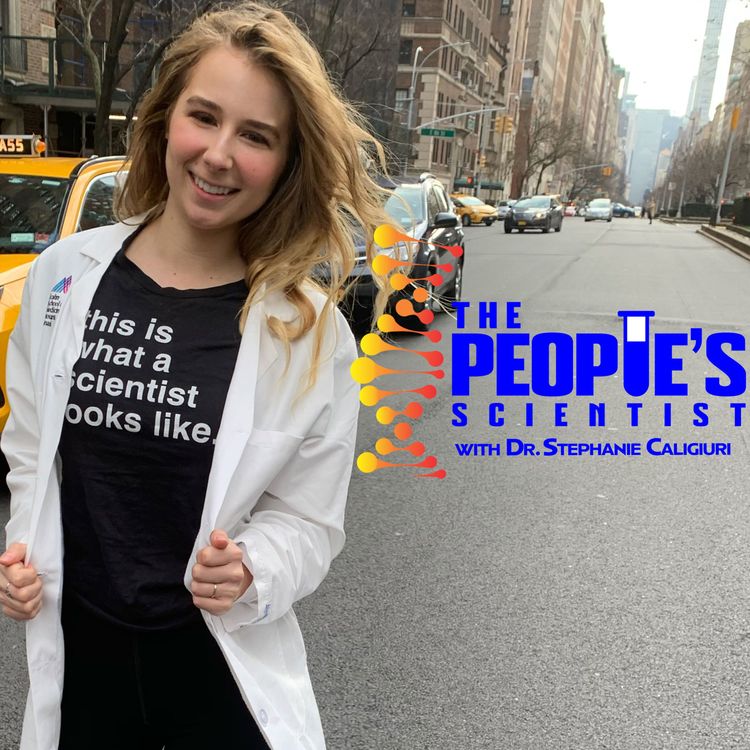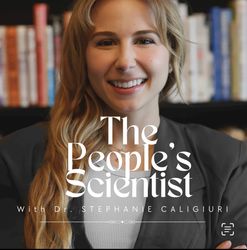Share

The People's Scientist
Can Indoor Plants Improve Our Air Quality and Mood?
In Episode 118 of The People's Scientist podcast, I share some scientific evidence on indoor plants and whether or not they improve air quality and measures of mental health and work productivity. In the segment foregone facts, I discuss how in 1907 it took scientists 30 years to prove that a plague of Pellagra in the South Eastern United States was due to a deficiency in vitamin B3 niacin, not due to a bacteria. Tune in for details!
Want to buy me a coffee to say thanks for the episode? You can do so via Venmo or Patreon below.
Venmo ID: Steph-Cal
Patreon: https://www.patreon.com/join/DrSCaligiuri
Follow me on social media to see the papers I cite in this week's episode:
IG: Dr.SCaligiuri
FB: ThePeoplesScientist
Twitter: DrSCaligiuri
Linkedin: Stephanie Caligiuri
TikTok: Dr.SCaligiuri
More episodes
View all episodes

158. 5 Lessons in 5 Years
31:41||Season 1, Ep. 158Come celebrate with me in this special episode where I reflect on the last 5 years and the most important lessons this podcast has taught me. The lessons didn't come from a study or a classroom. They came from life experience. These lessons have had a really big impact on my life and I hope that they may spark something positive in you too. I am looking forward to the next years to come with you!Want to buy me a coffee to say thanks for the episode? You can do so via Venmo or Patreon below.Venmo ID: Steph-CalPatreon: https://www.patreon.com/join/DrSCaligiurihttps://www.buymeacoffee.com/drscaligiuriFollow me on social media to see the papers I cite in this week's episode:IG: Dr.SCaligiuriFB: ThePeoplesScientistTwitter: DrSCaligiuriLinkedin: Stephanie CaligiuriTikTok: Dr.SCaligiuri
157. Echoes of Rain & Nature: From Ancient Seas to Recent Neuroimaging Studies
28:23||Season 1, Ep. 157As I gaze out my window, captivated by the raindrops, the thought struck me – what makes the sound of rain so incredibly calming? Thus, the inspiration for episode 157 was born. In today's installment, I delve into the effects that environmental sounds can exert on our stress management, sleep patterns, hormonal balance, and neurobiology. It's my belief that these impacts are often subtle, operating on a subconscious level, unbeknownst to many. The discussion spans the soothing tones of rain, the calming cadence of ocean waves, the melodic symphony of birds, and the bustling sounds of the city. I've included some sound clips, practical tips, and insights on how we can leverage this knowledge to enhance our well-being. Tune in for details!Want to buy me a coffee to say thanks for the episode? You can do so via Venmo or Patreon below.Venmo ID: Steph-CalPatreon: https://www.patreon.com/join/DrSCaligiurihttps://www.buymeacoffee.com/drscaligiuriFollow me on social media to see the papers I cite in this week's episode:IG: Dr.SCaligiuriFB: ThePeoplesScientistTwitter: DrSCaligiuriLinkedin: Stephanie CaligiuriTikTok: Dr.SCaligiuri
156. Unmasking the Top Three of 2023
28:59||Season 1, Ep. 156Wow what a year! 2023 was filled with a lot of wonderful changes to my scientific career. Thank you for coming along this ride with me. Come hang out with me as I countdown the top 3 most listened to episodes on the People's Scientist podcast of 2023. Which episode was your favorite?Want to buy me a coffee to say thanks for the episode? You can do so via Venmo or Patreon below.Venmo ID: Steph-CalPatreon: https://www.patreon.com/join/DrSCaligiurihttps://www.buymeacoffee.com/drscaligiuriFollow me on social media to see the papers I cite in this week's episode:IG: Dr.SCaligiuriFB: ThePeoplesScientistTwitter: DrSCaligiuriLinkedin: Stephanie CaligiuriTikTok: Dr.SCaligiuri
155. Scented Wisdom: Rediscovering The Power of Smell for Memory & Cognition
28:09||Season 1, Ep. 155I am so excited to be back producing episode 155 of The People's Scientist podcast. Thank you for allowing me to take a few months off from the show as I transitioned into my new role. Today I am excited to share a recent study with you in which scientists investigated a simple strategy we can all start using today that may enhance our memory and cognition. It has to do with one of our five senses that we seldom use purposefully, our sense of smell. Tune in for details! Want to buy me a coffee to say thanks for the episode? You can do so via Venmo or Patreon below.Venmo ID: Steph-CalPatreon: https://www.patreon.com/join/DrSCaligiurihttps://www.buymeacoffee.com/drscaligiuriFollow me on social media to see the papers I cite in this week's episode:IG: Dr.SCaligiuriFB: ThePeoplesScientistTwitter: DrSCaligiuriLinkedin: Stephanie CaligiuriTikTok: Dr.SCaligiuri
154. When Nutritional Science & Drug Addiction Research Collide
23:02||Season 1, Ep. 154In Episode 154 of The People's Scientist podcast, I discuss how consuming food, sugar, alcohol, nicotine, opioids, cocaine, are all consummatory behaviors; we are consuming substances with reinforcing and potentially addictive qualities. As such, there is much neurobiological overlap in eating and drug addiction. This nutritional perspective on drug addiction can open the door for novel treatments to aid in drug addiction recovery like GLP-1 and T2R agonists. Lately the medication (Ozempic) semaglutide, used to treat type-2 diabetes has garnered interest as a potential new strategy to investigate for drug addiction recovery. Tune in for details!Want to buy me a coffee to say thanks for the episode? You can do so via Venmo or Patreon below.Venmo ID: Steph-CalPatreon: https://www.patreon.com/join/DrSCaligiurihttps://www.buymeacoffee.com/drscaligiuriFollow me on social media to see the papers I cite in this week's episode:IG: Dr.SCaligiuriFB: ThePeoplesScientistTwitter: DrSCaligiuriLinkedin: Stephanie CaligiuriTikTok: Dr.SCaligiuri
153. The Energy Metabolome & Mental Health
29:31||Season 1, Ep. 153Today in Episode 153, I share with you a recent study published by Amin and colleagues in JAMA Psychiatry this year. This study includes over 125,000 people to correlate the plasma metabolome containing 249 metabolites to the diagnosis of major depressive disorder. I share additional clinical trials to take these findings and give us all some actionable information. Tune in for details!Main Reference: Amin et al. JAMA Psychiatry. 2023;80(6):597-609Want to buy me a coffee to say thanks for the episode? You can do so via Venmo or Patreon below.Venmo ID: Steph-CalPatreon: https://www.patreon.com/join/DrSCaligiurihttps://www.buymeacoffee.com/drscaligiuriFollow me on social media to see the papers I cite in this week's episode:IG: Dr.SCaligiuriFB: ThePeoplesScientistTwitter: DrSCaligiuriLinkedin: Stephanie CaligiuriTikTok: Dr.SCaligiuri
152. The Neuroscience of Perseverance
32:56||Season 1, Ep. 152In Episode 152, I was inspired by the song lyrics I danced to for this episode and chose to dive into the Neuroscience of Perseverance. Perseverance is distinct from resilience but the two are still very much interconnected. Resilience is an umbrella term, representing our ability to bounce back from adversity, our ability to adapt to change, and maintain a positive outlook. On the other hand, perseverance specifically refers to the act of persisting in the face of obstacles, staying focused on a goal, and maintaining effort over an extended period. I talk about the Science of Resilience back in episode 39 with the expert, Dennis Charney himself, so feel free to go back and give that one a listen if it interests you. In today's episode I share a quiz for us to assess our own level of persistence, I provide relatable examples, ways to improve our perseverance, and some neurobiology to help us understand what is going on in our brain when we persevere. Tune in for details!Want to buy me a coffee to say thanks for the episode? You can do so via Venmo or Patreon below.Venmo ID: Steph-CalPatreon: https://www.patreon.com/join/DrSCaligiurihttps://www.buymeacoffee.com/drscaligiuriFollow me on social media to see the papers I cite in this week's episode:IG: Dr.SCaligiuriFB: ThePeoplesScientistTwitter: DrSCaligiuriLinkedin: Stephanie CaligiuriTikTok: Dr.SCaligiuri
151. Neuroplasticity & The Freedom To Change
29:47||Season 1, Ep. 151In Episode 151, I discuss neuroplasticity as an adaptive process of the brain that can either be detrimental or beneficial. I discuss drug addiction, mental health, hormones, psychedelics, exercise, meditation, and more. I also discuss how I think the concept of neuroplasticity can support the notion of the freedom for change as opposed to determinism. Neuroplasticity can empower us to change our current situation. Tune in for details!Want to buy me a coffee to say thanks for the episode? You can do so via Venmo or Patreon below.Venmo ID: Steph-CalPatreon: https://www.patreon.com/join/DrSCaligiurihttps://www.buymeacoffee.com/drscaligiuriFollow me on social media to see the papers I cite in this week's episode:IG: Dr.SCaligiuriFB: ThePeoplesScientistTwitter: DrSCaligiuriLinkedin: Stephanie CaligiuriTikTok: Dr.SCaligiuri
150. Three Easy Nutrition Strategies to Promote Brain Health & Mental Well-Being
32:36||Season 1, Ep. 150In the 150th Episode of the People Scientist podcast, I want to share with you, from my 17 years of experience in this field, some top evidenced based nutrition strategies that I think are easy to incorporate and likely to have a significant impact on our brain health and mental well-being. Any guesses as to what my top three suggestions are? Tune in to find out!Want to buy me a coffee to say thanks for the episode? You can do so via Venmo or Patreon below.Venmo ID: Steph-CalPatreon: https://www.patreon.com/join/DrSCaligiurihttps://www.buymeacoffee.com/drscaligiuriFollow me on social media to see the papers I cite in this week's episode:IG: Dr.SCaligiuriFB: ThePeoplesScientistTwitter: DrSCaligiuriLinkedin: Stephanie CaligiuriTikTok: Dr.SCaligiuri